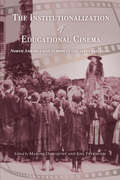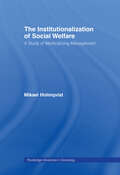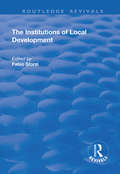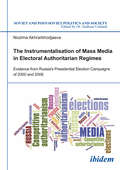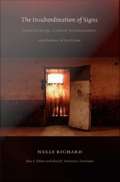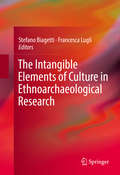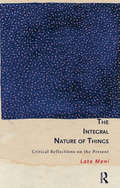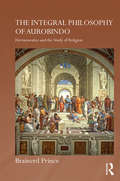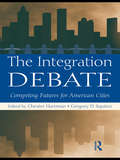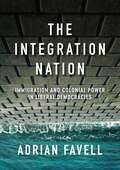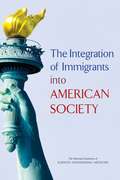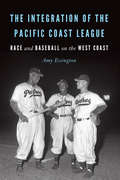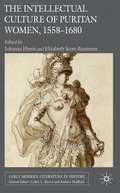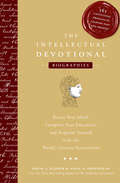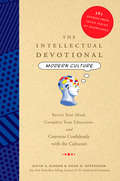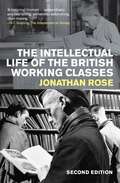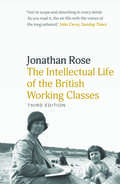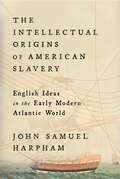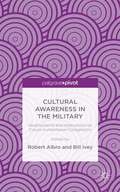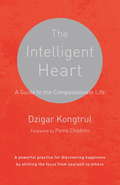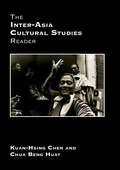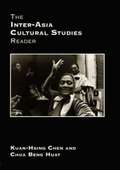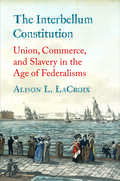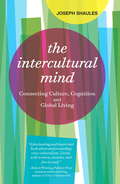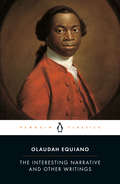- Table View
- List View
The Institutionalization of Educational Cinema: North America and Europe in the 1910s and 1920s
by Marina Dahlquist and Joel FrykholmEssays by scholars on how film has been used by schools, libraries, governments, and organizations for educational purposes.The potential of films to educate has been crucial for the development of cinema intended to influence culture, and is as important as conceptions of film as a form of art, science, industry, or entertainment. Using the concept of institutionalization as a heuristic for generating new approaches to the history of educational cinema, contributors to this volume study the co-evolving discourses, cultural practices, technical standards, and institutional frameworks that transformed educational cinema from a convincing idea into an enduring genre. The Institutionalization of Educational Cinema examines the methods of production, distribution, and exhibition established for the use of educational films within institutions—such as schools, libraries, and industrial settings—in various national and international contexts and takes a close look at the networks of organizations, individuals, and government agencies that were created as a result of these films’ circulation. Through case studies of educational cinemas in different North American and European countries that explore various modes of institutionalization of educational film, this book highlights the wide range of vested interests that framed the birth of educational and nontheatrical cinema.
The Institutionalization of Social Welfare: A Study of Medicalizing Management (Routledge Advances in Sociology #Vol. 30)
by Mikael HolmqvistToday most countries rely on formally organized welfare programs - in some cases to the extent that they are labeled "welfare states". These programs, which have been constructed over the last decades, make up a larger national and international system of good intentions. Overall, it appears inconceivable to imagine "civilized society" without a comprehensive organizational system of social welfare. Social welfare has become a "holy cow" in many societies; an institutionalized aspect of modern life. But how does the institutionalization of social welfare occur through the concrete activities it enacts; and why does the institutionalization of social welfare appear to be so particularly successful in relation to other institutionalizing phenomena? These are central problems for any sociological analysis of contemporary society’s organization and are the main locus of attention of this book. Holmqvist explores how a social welfare organization becomes a self-evident phenomenon by "medicalizing" its environment: a way of "solving" social problems by viewing and treating them as medical problems. This study generates new understandings of how institutionalization of organizations comes about and contributes fresh insight to the area of social welfare policies.
The Institutions of Local Development (Routledge Revivals Ser.)
by Fabio SforziThis title was first published in 2003. Development is a complex and heterogeneous phenomenon, driven by the expansion of one or more sectors and their influence on the others. It is the outcome of local interdependencies among firms, households and institutions which give rise to specific territorial patterns of local systems. Policies of development cannot therefore restrict themselves to undifferentiated intervention from the centre to the periphery, but must be able to stimulate and sustain endogenous bottom-up growth by means of specific programmes. Thus, individuals and organizations, public or private interact, take decisions and devise strategies in a context that is simultaneously co-operative and competitive. The first in a series, this volume brings together a team of leading international social scientists from the IGU study group on local development. Illustrated by a wide range of global case studies, it analyses what knowledge is required for industrial production and how best to organize this knowledge, embedded as it is in physical, human and social capital. It focuses on the formation of social capital and the various forms into which this may evolve, in particular, the sets of institutions which regulate relationships within and among firms.
The Instrumentalisation of Mass Media in Electoral Authoritarian Regimes: Evidence from Russia's Presidential Election Campaigns of 2000 and 2008 (Soviet and Post-Soviet Politics and Society #164)
by Nozima AkhrarkhodjaevaFocusing on the case of Russia during Putin's first two presidential terms, this book examines media manipulation strategies in electoral authoritarian regimes. Which instruments and approaches do incumbent elites employ to skew media coverage in favor of their preferred candidate in a presidential election? What effects do these strategies have on news content? Based on two case studies of the presidential election campaigns in Russia in 2000 and in 2008, this investigation identifies the critical internal mechanisms according to which these regimes work.Looking at the same country while it transformed from a competitive into a hegemonic authoritarian regime, allows a diachronic comparison of these two regime types. The book explicates the subtle differences between competitive and hegemonic regimes, different types of media manipulation strategies, the diverging extent of media instrumentalization, various interactions among state actors, large business owners, the media, and journalists, the respective effects that all these factors and interactions have on media content, and the peculiar types of bias prevalent in each type of regime. This deep exploration of post-Soviet politics is based on extensive review of documents, interviews with media professionals, and quantitative as well as qualitative content analyses of news media during two Russian presidential election campaigns.
The Insubordination of Signs: Political Change, Cultural Transformation, and Poetics of the Crisis
by Nelly RichardNelly Richard is one of the most prominent cultural theorists writing in Latin America today. As a participant in Chile's neo-avantgarde, Richard worked to expand the possibilities for cultural debate within the constraints imposed by the Pinochet dictatorship (1973-1990), and she has continued to offer incisive commentary about the country's transition to democracy. Well known as the founder and director of the influential journal Revista de crítica cultural, based in Santiago, Richard has been central to the dissemination throughout Latin America of work by key contemporary thinkers, including Néstor García Canclini, Jacques Derrida, Fredric Jameson, and Diamela Eltit. Her own writing provides rigorous considerations of Latin American identity, postmodernism, gender, neoliberalism, and strategies of political and cultural resistance. In The Insubordination of Signs Richard theorizes the cultural reactions--particularly within the realms of visual arts, literature, and the social sciences--to the oppression of the Chilean dictatorship. She reflects on the role of memory in the historical shadow of the military regime and on the strategies offered by marginal discourses for critiquing institutional systems of power. She considers the importance of Walter Benjamin for the theoretical self-understanding of the Latin American intellectual left, and she offers revisionary interpretations of the Chilean neo-avantgarde in terms of its relationships with the traditional left and postmodernism. Exploring the gap between Chile's new left social sciences and its "new scene" aesthetic and critical practices, Richard discusses how, with the return of democracy, the energies that had set in motion the democratizing process seemed to exhaust themselves as cultural debate was attenuated in order to reduce any risk of a return to authoritarianism.
The Intangible Elements of Culture in Ethnoarchaeological Research
by Stefano Biagetti Francesca LugliThis volume focuses on the intangible elements of human cultures, whose relevance in the study of archaeology has often been claimed but rarely practiced. In this book, the authors successfully show how the adoption of ethnoarchaeological perspectives on non-material aspects of cultures can support the development of methodologies aimed at refining the archaeological interpretation of ancient items, technologies, rituals, settlements and even landscape. The volume includes a series of new approaches that can foster the dialogue between archaeology and anthropology in the domain of the intangible knowledge of rural and urban communities. The role of ethnoarchaeology in the study of the intangible heritage is so far largely underexplored, and there is a considerable lack of ethnoarchaeological studies explicitly focused on the less tangible evidence of present and past societies. Fresh case studies will revitalize the theoretical debate around ethnoarchaeology and its applicability in the archaeological and heritage research in the new millennium. Over the past decade, 'intangible' has become a key word in anthropological research and in heritage management. Archaeological theories and methods regarding the explorations of the meaning and the significance of artifacts, resources, and settlement patterns are increasingly focusing on non-material evidence. Due to its peculiar characteristics, ethnoarchaeology can effectively foster the development of the study of the intangible cultural heritage of living societies, and highlight its relevance to the study of those of the past.
The Integral Nature of Things: Critical Reflections on the Present
by Lata ManiThe world is an interdependent whole of which everything is an integral, complexly related, part. Yet current ways of thinking, and being, persistently separate social phenomena and the individual self from the multiple dimensions with which they are interconnected. The Integral Nature of Things examines this revealing paradox and its consequences in a variety of sites: everyday language, labour, advertising, technology, post-structuralist theory, political rhetoric, urban planning, sex, neoliberal globalisation. Mani demonstrates how even though the interrelations between things are obscured by the ruling paradigm, the facts of relationality and indivisibility continually assert themselves. The book interweaves prose with poetry and sociocultural analysis with observational accounts to offer an alternative framework for addressing aspects of the cognitive, cultural, political, and ethical crisis we face today.
The Integral Philosophy of Aurobindo: Hermeneutics and the Study of Religion (Routledge Hindu Studies Series)
by Brainerd PrinceSri Aurobindo was an Indian nationalist, philosopher, yogi, guru, and poet. This book is an enquiry into the integral philosophy of Aurobindo and its contemporary relevance. It offers a reading of Aurobindo’s key texts by bringing them into conversation with religious studies and the hermeneutical traditions. The central argument is that Aurobindo’s integral philosophy is best understood as a hermeneutical philosophy of religion. Such an understanding of Aurobindo’s philosophy, offering both substantive and methodological insights for the academic study of religion, subdivides into three interrelated aims. The first is to demonstrate that the power of the Aurobindonian vision lies in its self-conception as a traditionary-hermeneutical enquiry into religion; the second, to draw substantive insights from Aurobindo’s enquiry to envision a way beyond the impasse within the current religious-secular debate in the academic study of religion. Working out of the condition of secularism, the dominant secularists demand the abandonment of the category ‘religion’ and the dismantling of the academic discipline of religious studies. Aurobindo’s integral work on ‘religion’, arising out of the Vedānta tradition, critiques the condition of secularity that undergirds the religious-secular debate. Finally, informed by the hermeneutical tradition and building on the methodological insights from Aurobindo's integral method, the book explores a hermeneutical approach for the study of religion which is dialogical in nature. This book will be of interest to academics studying Religious Studies, Philosophy of Religion, Continental Hermeneutics, Modern India, Modern Hinduism as well as South Asian Studies.
The Integration Debate: Competing Futures For American Cities
by Chester Hartman Gregory D. SquiresRacial integration, and policies intended to achieve greater integration, continue to generate controversy in the United States, with some of the most heated debates taking place among long-standing advocates of racial equality. Today, many nonwhites express what has been referred to as "integration exhaustion" as they question the value of integration in today’s world. And many whites exhibit what has been labeled "race fatigue," arguing that we have done enough to reconcile the races. Many policies have been implemented in efforts to open up traditionally restricted neighborhoods, while others have been designed to diversify traditionally poor, often nonwhite, neighborhoods. Still, racial segregation persists, along with the many social costs of such patterns of uneven development. This book explores both long-standing and emerging controversies over the nation’s ongoing struggles with discrimination and segregation. More urgently, it offers guidance on how these barriers can be overcome to achieve truly balanced and integrated living patterns.
The Integration Nation: Immigration and Colonial Power in Liberal Democracies (Immigration and Society)
by Adrian FavellThe notion of ‘immigrant integration’ is used everywhere – by politicians, policy makers, journalists and researchers – as an all-encompassing framework for rebuilding ‘unity from diversity’ after large-scale immigration. Promising a progressive middle way between backward-looking ideas of assimilation and the alleged fragmentation of multiculturalism, ‘integration’ has become the default concept for states scrambling to deal with global refugee management and the persistence of racial disadvantage. Yet ‘integration’ is the continuance of a long-standing colonial development paradigm. It is how majority-white liberal democracies absorb and benefit from mass migration while maintaining a hierarchy of race and nationality – and the global inequalities it sustains. Immigrant integration sits at the heart of the neo-liberal racial capitalism of recent decades, in which tight control of nation-building and bordering selectively enables some citizens to enjoy the mobilities of a globally integrating world, as other populations are left behind and locked out. Subjecting research and policy on immigrant integration to theoretical scrutiny, The Integration Nation offers a fundamental rethink of a core concept in migration, ethnic and racial studies in the light of the challenge posed by decolonial theory and movements.
The Integration of Immigrants into American Society
by Engineering Medicine National Academies of SciencesThe United States prides itself on being a nation of immigrants, and the country has a long history of successfully absorbing people from across the globe. The integration of immigrants and their children contributes to our economic vitality and our vibrant and ever changing culture. We have offered opportunities to immigrants and their children to better themselves and to be fully incorporated into our society and in exchange immigrants have become Americans - embracing an American identity and citizenship, protecting our country through service in our military, fostering technological innovation, harvesting its crops, and enriching everything from the nation’s cuisine to its universities, music, and art. Today, the 41 million immigrants in the United States represent 13.1 percent of the U.S. population. The U.S.-born children of immigrants, the second generation, represent another 37.1 million people, or 12 percent of the population. Thus, together the first and second generations account for one out of four members of the U.S. population. Whether they are successfully integrating is therefore a pressing and important question. Are new immigrants and their children being well integrated into American society, within and across generations? Do current policies and practices facilitate their integration? How is American society being transformed by the millions of immigrants who have arrived in recent decades? To answer these questions, this new report from the National Academies of Sciences, Engineering, and Medicine summarizes what we know about how immigrants and their descendants are integrating into American society in a range of areas such as education, occupations, health, and language.
The Integration of the Pacific Coast League: Race and Baseball on the West Coast
by Amy EssingtonWhile Jackie Robinson’s 1947 season with the Brooklyn Dodgers made him the first African American to play in the Major Leagues in the modern era, the rest of Major League Baseball was slow to integrate while its Minor League affiliates moved faster. The Pacific Coast League (PCL), a Minor League with its own social customs, practices, and racial history, and the only legitimate sports league on the West Coast, became one of the first leagues in any sport to completely desegregate all its teams. Although far from a model of racial equality, the Pacific Coast states created a racial reality that was more diverse and adaptable than in other parts of the country.The Integration of the Pacific Coast League describes the evolution of the PCL beginning with the league’s differing treatment of African Americans and other nonwhite players. Between the 1900s and the 1930s, team owners knowingly signed Hawaiian players, Asian players, and African American players who claimed that they were Native Americans, who were not officially banned. In the post–World War II era, with the pressures and challenges facing desegregation, the league gradually accepted African American players. In the 1940s individual players and the local press challenged the segregation of the league. Because these Minor League teams integrated so much earlier than the Major Leagues or the eastern Minor Leagues, West Coast baseball fans were the first to experience a more diverse baseball game.
The Intellectual Culture of Puritan Women, 1558–1680
by Johanna Harris Elizabeth Scott-BaumannThis collection of essays by leading scholars in the field reveals the major contribution of puritan women to the intellectual culture of the early modern period. It demonstrates that women's roles within puritan and broader communities encompassed translating and disseminating key texts, producing an impressive body of original writing.
The Intellectual Devotional: Revive Your Mind, Complete Your Education, and Acquaint Yourself with the World' s Greatest Personalities (The Intellectual Devotional Series)
by David S. Kidder Noah D. OppenheimThe fifth installment of this bestselling series features 365 captivating entries about the most celebrated personalities in history. <P><P>Like its compulsively readable predecessors, The Intellectual Devotional: Biographies is organized into seven categories, one for each day of the week. With their trademark wit and style, authors David Kidder and Noah Oppenheim offer an array of fascinating facts about major figures from Atilla the Hun to Desmond Tutu. <P>In this daily devotional, learn about: <br>• authors and artists, from Homer and Ovid to Oscar Wilde and Virginia Woolf• leaders, such as Queen Elizabeth I, Abraham Lincoln, Susan B. Anthony, and Napoleon Bonaparte <br>• innovators, from Johannes Gutenberg to Isaac Newton to Werner Heisenberg• philosophers, including Socrates, Epicurus, Friedrich Nietzsche, and Jean-Paul Sartre <br>• rebels and reformers, from Joan of Arc and Spartacus to Galileo and Che Guevara <br>• preachers and prophets, including Lao-tzu, John the Baptist, Martin Luther, and Gandhi <br>• villains, such as Benedict Arnold, Genghis Khan, Ivan the Terrible, and Jack the Ripper <P>This volume shares the personal histories, accomplishments,and troubles of 365 people who have left an indelible mark on the world.
The Intellectual Devotional: Revive Your Mind, Complete Your Education, and Converse Confidently with the Cul turati (The Intellectual Devotional Series)
by David S. Kidder Noah D. OppenheimIn the tradition of the instant bestsellers The Intellectual Devotional and The Intellectual Devotional: American History comes the third installment in this indispensable series. <P><P> In The Intellectual Devotional: Modern Culture, authors David S. Kidder and Noah D. Oppenheim explore the fascinating world of contemporary culture to offer 365 daily readings that provide the essential references needed to navigate the world today. <P><P>Quench your intellectual thirst with an overview of the literature, music, film, personalities, trends, sports, and pop references that have defined the way we live. From the Slinky to Star Wars; Beatlemania to Babe Ruth; flappers to fascism—refreshing your memory and dazzling your friends has never been easier, or more fun. <P>Whether you're a trivia genius, pop-culture buff, or avid reader, you'll be riveted by this comprehensive journey through contemporary culture.
The Intellectual Life of the British Working Classes
by Jonathan RoseWhich books did the British working classes read--and how did they read them? How did they respond to canonical authors, penny dreadfuls, classical music, school stories, Shakespeare, Marx, Hollywood movies, imperialist propaganda, the Bible, the BBC, the Bloomsbury Group? What was the quality of their classroom education? How did they educate themselves? What was their level of cultural literacy: how much did they know about politics, science, history, philosophy, poetry, and sexuality? Who were the proletarian intellectuals, and why did they pursue the life of the mind?These intriguing questions, which until recently historians considered unanswerable, are addressed in this book. Using innovative research techniques and a vast range of unexpected sources, The Intellectual Life of the British Working Classes tracks the rise and decline of the British autodidact from the pre-industrial era to the twentieth century. It offers a new method for cultural historians--an "audience history" that recovers the responses of readers, students, theatergoers, filmgoers, and radio listeners. Jonathan Rose provides an intellectual history of people who were not expected to think for themselves, told from their perspective. He draws on workers' memoirs, oral history, social surveys, opinion polls, school records, library registers, and newspapers. Through its novel and challenging approach to literary history, the book gains access to politics, ideology, popular culture, and social relationships across two centuries of British working-class experience.
The Intellectual Life of the British Working Classes
by Jonathan RoseThis is a landmark intellectual history of Britain&’s working classes from the preindustrial era to the twentieth century. Drawing on workers&’ memoirs, social surveys, library registers, and more, Jonathan Rose uncovers which books people read, how they educated themselves, and what they knew. A new preface addresses the continuing relevance of the book amidst the upheavals of the present day. &“An astonishing book.&”—Ian Sansom, The Guardian &“A passionate work of history. . . . Rose has written a work of staggering ambition.&”—Daniel Akst, Wall Street Journal Winner of the SHARP Book History Prize, the American Philosophical Society&’s Jacques Barzun Prize, and the British Council Prize cowinner of the Longman-History Today Book of the Year Prize for 2001; named one of the finest books of 2001 by The Economist.
The Intellectual Origins of American Slavery: English Ideas in the Early Modern Atlantic World
by John Samuel HarphamA landmark account of the origins of American slavery, revealing how ancient Roman ideas were used to defend the establishment of a slave empire in the English Atlantic world.The period from 1550 to 1700 was critical in the development of slavery across the English Atlantic world. During this time, English discourse about slavery revolved around one central question: How could free persons be made into slaves? John Samuel Harpham shows that English authors found answers to this question in a tradition of ideas that stretched back to the ancient world, where they were most powerfully expressed in Roman law. These ideas, in turn, became the basis for the earliest defenses of American slavery.The Roman tradition had located the main source of slavery in war: enslavement was the common fate of captives who otherwise faced execution. In early modern England, this account was incorporated into studies of the common law and influential natural rights theories by the likes of Hugo Grotius and John Locke. When Europeans started to publish firsthand accounts of Africa in the sixteenth century, these reports were thus received into a culture saturated with Roman ideas. Over time, English observers started to assert that the common customs of enslavement among the nations of Africa fit within the Roman model. Englishmen had initially expressed reluctance to take part in the Atlantic slave trade. But once assured that the slave trade could be traced back to customs they understood to be legitimate, they proved keen to profit from it.An eloquent account of the moral logic that propelled the development of an immoral institution, The Intellectual Origins of American Slavery reveals the power of an overlooked tradition of ideas in the history of human bondage.
The Intellectual and the People in Egyptian Literature and Culture: Amāra and the 2011 Revolution
by Ayman A. El-DesoukyFeaturing chapters from social scientists directly engaged with the process, this volume offers a concise introduction to the U. S. military's effort to account for culture and increase its cultural capacity over the last decade. Contributors to this work consider some of the key challenges, lessons learned, and the limits of such efforts.
The Intelligent Heart
by Dzigar Kongtrul"Dzigar Kongtr l's lively and accessible presentation of the Tibetan training method known as lojong (mind training) focuses on what he considers the heart of that practice: tonglen, the practice of exchanging self for other, for taking in others' pain and suffering and sending out kindness, ease, and consolation. It's a powerful method for developing compassion of the most tranformative kind, and its supreme expression is found in the classic text The Great Path of Awakening by Jamgon Kongtr l. This book is Dzigar Kongtr l's commentary on that beloved text, based on a series of talks he gave on it. It includes his fresh translation of the Great Path, and it is full of his characteristic humor as well as his skill in translating esoteric concepts into terms that not only are easily understood but that speak directly to the heart. "
The Inter-Asia Cultural Studies Reader
by Kuan-Hsing Chen Beng Huat ChuaAsian Cultural Studies or Cultural Studies in Asia is a new and burgeoning field, and the Inter-Asia Cultural Studies Journal is at its cutting edge. Committed to bringing Asian Cultural Studies scholarship to the international English speaking world and constantly challenging existing conceptions of cultural studies, the journal has emerged as the leading publication in Cultural Studies in Asia. The Inter-Asia Cultural Studies Reader brings together the best of the ground breaking papers published in the journal and includes a new introduction by the editors, Chen Kuan-Hsing and Chua Beng Huat. Essays are grouped in thematic sections, including issues which are important across the region, such as State violence and social movements and work produced by IACS sub-groups, such as feminism, queer studies, cinema studies and popular culture studies. The Reader provides useful alternative case studies and challenging perspectives, which will be invaluable for both students and scholars in media and cultural studies.
The Inter-Asia Cultural Studies Reader
by Chua Beng Huat Kuan-Hsing ChenAsian Cultural Studies or Cultural Studies in Asia is a new and burgeoning field, and the Inter-Asia Cultural Studies Journal is at its cutting edge. Committed to bringing Asian Cultural Studies scholarship to the international English speaking world and constantly challenging existing conceptions of cultural studies, the journal has emerged as the leading publication in Cultural Studies in Asia. The Inter-Asia Cultural Studies Reader brings together the best of the ground breaking papers published in the journal and includes a new introduction by the editors, Chen Kuan-Hsing and Chua Beng Huat. Essays are grouped in thematic sections, including issues which are important across the region, such as State violence and social movements and work produced by IACS sub-groups, such as feminism, queer studies, cinema studies and popular culture studies. The Reader provides useful alternative case studies and challenging perspectives, which will be invaluable for both students and scholars in media and cultural studies.
The Interbellum Constitution: Union, Commerce, and Slavery in the Age of Federalisms (Yale Law Library Series in Legal History and Reference)
by Alison L. LaCroixA synthesis of legal, political, and social history to show how the post-founding generations were forced to rethink and substantially revise the U.S. constitutional vision Between 1815 and 1861, American constitutional law and politics underwent a profound transformation. These decades of the Interbellum Constitution were a foundational period of both constitutional crisis and creativity. The Interbellum Constitution was a set of widely shared legal and political principles, combined with a thoroughgoing commitment to investing those principles with meaning through debate. Each of these shared principles—commerce, concurrent power, and jurisdictional multiplicity—concerned what we now call &“federalism,&” meaning that they pertain to the relationships among multiple levels of government with varying degrees of autonomy. Alison L. LaCroix argues, however, that there existed many more federalisms in the early nineteenth century than today&’s constitutional debates admit. As LaCroix shows, this was a period of intense rethinking of the very basis of the U.S. national model—a problem debated everywhere, from newspapers and statehouses to local pubs and pulpits, ultimately leading both to civil war and to a new, more unified constitutional vision. This book is the first that synthesizes the legal, political, and social history of the early nineteenth century to show how deeply these constitutional questions dominated the discourse of the time.
The Intercultural Mind: Connecting Culture, Cognition, and Global Living
by Joseph ShaulesIn this pioneering book, Joseph Shaules presents exciting new research from cultural psychology and neuroscience. It sheds light on the hidden influence of culture on the unconscious mind, and helps people get more out of their intercultural journeys.The Intercultural Mind presents new perspectives on important questions such as: What is culture shock, and how does it affect us? Why are we blind to our own cultural conditioning? Can cultural differences be measured? What does it mean to have an international mindset? Illustrated with a wealth of examples and memorable stories, The Intercultural Mind is a fascinating look at how intercultural experiences can transform the geography of our minds.
The Interesting Narrative and Other Writings: Revised Edition
by Olaudah EquianoAn exciting and often terrifying adventure story, as well as an important precursor to such famous nineteenth-century slave narratives as Frederick Douglass's autobiographies, Olaudah Equiano's Narrative recounts his kidnapping in Africa at the age of ten, his service as the slave of an officer in the British Navy, his ten years of labor on slave ships until he was able to purchase his freedom in 1766, and his life afterward as a leading and respected figure in the antislavery movement in England. A spirited autobiography, a tale of spiritual quest and fulfillment, and a sophisticated treatise on religion, politics, and economics, The Interesting Narrativeis a work of enduring literary and historical value.
